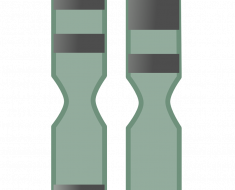A “Yes” or “no” to organ donation requires to deal with your own death. More than every third citizen in Germany has done this and has an organ donor card. Most people – 72 percent – are using the card to Organ and tissue donation in the event of brain death to comply. About 14 percent use the identification card to an organ donation. Nine percent delegate the decision to another Person.
The Figures show, however, that Around two-thirds of Germans do not have an organ donor card. In the case of a brain death – for instance, after an accident – in these cases, inevitably, the question of the desire of the patient or of the patient: he or she Had hints to family members? He wanted to, or you donate, in principle, organs? If Yes, what is it? These questions can be for members of a very nerve-wracking, also because they often cannot be answered without a doubt. This uncertainty is due to a decision during his lifetime to prevent it.

Prof. Dr. med. Giovanni Maio is a medical ethicist and Director of the Institute for ethics and history of medicine at the University of Freiburg. He is the author of the book “medicine without a degree? From the dictation of what is possible to an ethics of prudence”.
The star spoke with the medical ethicist, Professor Giovanni Maio on the often-difficult process of decision-making. Maio is the Director of the Institute for ethics and history of medicine at the University of Freiburg and called for a “well-considered decision of the Individual”.
How can this be achieved? Maio called in the conversation thought-provoking ideas for personal decision-making. They are summarized here:
Meaningful Donation
People who donate their organs to give other people a life time and quality of life. Kidney disease can be removed by a donated kidney, for example, by dialysis. There are people who perceive that as meaningful, and for organ donation, to decide.
Personal Wish
It is a personal request to donate his organs after brain death. It is a personal desire to donate his organs after brain death. Both wishes should be respected. There is no right and no wrong.
The donation as a gift
The essence of the organ donation derives from the name: it is a donation, a gift. Each person must choose whether he wants to give this gift. No one shall be forced to this gift.
Conversations
It is reasonable to talk to the close ones about the personal decision for or against organ donation. In the case of brain death, the family members are inevitably confronted with this decision. To communicate his wishes to pre-clear, prevents Doubt. Nevertheless, it is important that the members have no influence on the decision-making process. It is a personal decision that everyone should take any for themselves. The Central question is: How to deal with my body and my organs in the event of my brain death?
Brain death versus death
Organ removal is only made in the case of brain-dead people. A brain death is irreversible. However, a brain-dead person is not a body. A brain-dead person is rather to be in an irreversible state of no longer Rettbaren. There are a lot of questions can be derived: I Want to be in this state more respiration, thus the Doctors can prepare for the removal of the organ? How to take my family from me goodbye? How I want to handle in the last Phase with me?
Open-Ended Questions
Many people find it difficult to deal with questions in connection with the Die. You may or may not want to face these questions. This must also be respected. Against this Backdrop, the opposition solution is to be seen critically, as a Silence to these questions is interpreted as a ‘ Yes ‘ to organ donation, and one is thus forced to not do something, if you want about your own body.
Free of pressure
That organ donations to help sick people, is indisputable. Nevertheless, it may not be pressure for the Individual. No one has a legal and moral claim to the body of another Person. A debate on the pros and Cons of organ donation must be guided interests of free and open. You should above all serve one purpose: a good and well-considered decision of the Individual.
The star brought out on the topic of organ donation is a separate series. In the current edition you can read: “The journey of the heart: What happens when a person dies and his organs to save others?”








